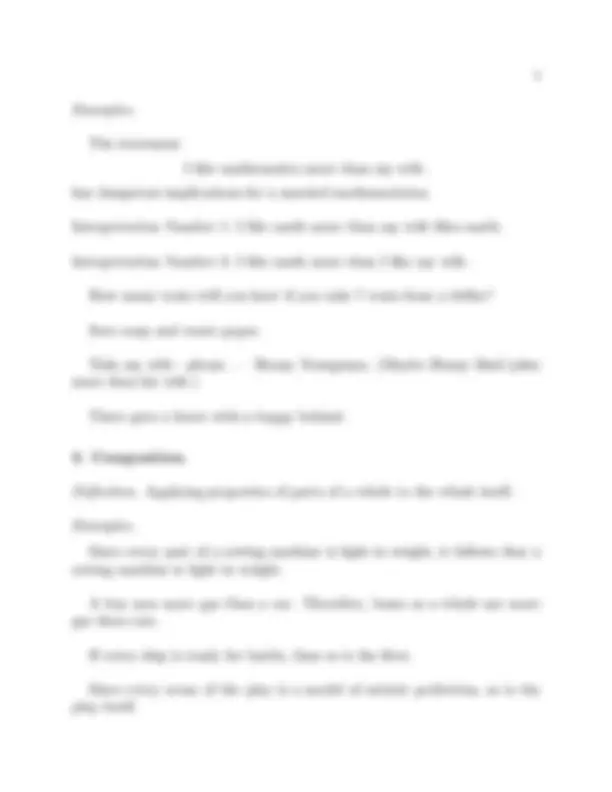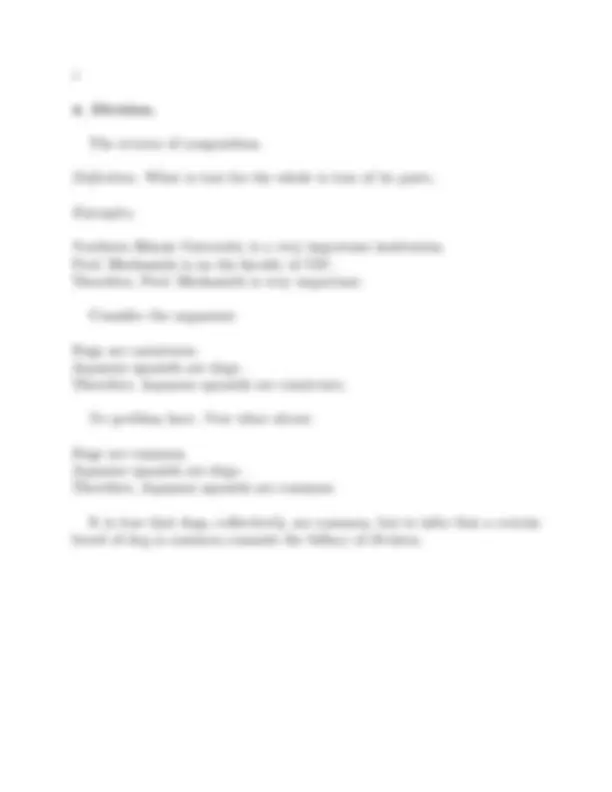




Study with the several resources on Docsity

Earn points by helping other students or get them with a premium plan


Prepare for your exams
Study with the several resources on Docsity

Earn points to download
Earn points by helping other students or get them with a premium plan
Community
Ask the community for help and clear up your study doubts
Discover the best universities in your country according to Docsity users
Free resources
Download our free guides on studying techniques, anxiety management strategies, and thesis advice from Docsity tutors
Material Type: Paper; Class: Core Competency in Mathematics; Subject: MATHEMATICAL SCIENCES; University: Northern Illinois University; Term: Unknown 1989;
Typology: Papers
1 / 4

This page cannot be seen from the preview
Don't miss anything!



Fallacies of Ambiguity
These fallacies typically occur in an argument using ambiguous words or phrases, whose meaning shifts and changes (to various degrees of subtlety) during the course of the argument. We consider 4 common types of such fallacies.
Definition. Equivocation is the use of expressions of double meaning in order to mislead.
Examples.
The end justifies the means. Death is the end of life. Therefore, one’s death justifies the means of life.
Here the word “end” is used in two ways: (1) as a goal and (2) as the last event.
Some arguments get pretty absurd, as the following example shows:
God is Love. Love is blind. Ray Charles is blind. Therefore, Ray Charles is God.
Christopher Robin gave a deep sigh, picked his Bear up by the leg, and walked off to the door, trailing Pooh behind him. – A. A. Milne
Consider the argument:
An elephant is an animal. 1
Therefore, a gray elephant is a gray animal.
No problem here. Now consider the argument:
An elephant is an animal. Therefore, a small elephant is a small animal.
Big problem here. Small elephants are no doubt still pretty big creatures. The equivocation hinges on the word “small,” which is a relative term. “Small” for an elephant is not the same as “small” for an animal. “Gray,” on the other hand, is not a relative term.
Definition. An unclear statement because of the loose or awkward way its words are combined.
The reverse of composition.
Definition. What is true for the whole is true of its parts.
Examples.
Northern Illinois University is a very important institution. Prof. Blecksmith is on the faculty of NIU. Therefore, Prof. Blecksmith is very important.
Consider the argument:
Dogs are carnivores. Japanese spaniels are dogs. Therefore, Japanese spaniels are carnivores.
No problem here. Now what about:
Dogs are common. Japanese spaniels are dogs. Therefore, Japanese spaniels are common.
It is true that dogs, collectively, are common, but to infer that a certain breed of dog is common commits the fallacy of division.